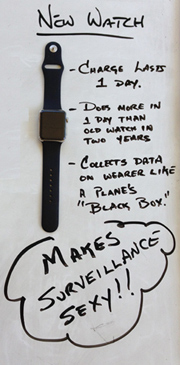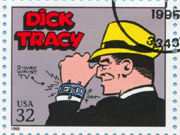Why Apple Watch & Facebook Win as Pebble Watch & Twitter Struggle
How commercialization, personal data and your place among an Internet of Things will be the fortune of digital platforms
I’ve had a Pebble watch for more than two years and really never saw what all the fuss was about wearables. Yesterday I unboxed an Apple Watch and in just a few hours it led me to exactly what the fuss is about, and why this is, to use an over-heated word, transformational.
During those two years, countless people eagerly asked if my Pebble was an early Apple Watch – and my reflexive retort was “No, this watch isn’t near smart enough to be an Apple Watch, but that’s kind of reassuring to me.”
Over two years, I found few uses for the Pebble, other than reading different kinds of text messages, spotting incoming phone calls, and of course telling time. I blamed myself and a lack of free time for my glancingly light adoption. And I wondered how this could be any different with Apple.
The Apple Watch’s materials and functions let it do things the Pebble couldn’t, like making Dick Tracy watch calls and using a screen with high resolution color. But it’s not the materials, or their arrangement which made it so much more immediately useful it’s the thinking behind it. Apple identified a group of intended product uses and focused the watch’s design and ownership experience around that.
Today every company is in education
Just as every company is in software, I increasingly believe all companies are in education. In this post-manual era, time starved customers need training and motivation to master new products.
Apple did this, Pebble didn’t, and the difference of the products’ impact on me as a customer couldn’t be more different. I suspect Apple’s primary use cases influenced feature development, software app creation and communications. Its watch had quick modules of video training which told users how to quickly start using their watch for phone calls, voice search, payment, health & fitness data, navigation and music.
My friends at MIT who own Pebbles found programs and coded up If That Then This scripts, they’ve made their Pebbles do great things. In comparison, Apple relieved their customers from wandering about and assembling their way to a few idiosyncratic life solutions. They connected more use cases to my life in a day than Pebble did in two years.
But as much as I’m in awe of it, I also wonder if Apple’s narcotic ease of adoption comes at a cost beyond the product’s price.
 The watch that could make surveillance sexy
The watch that could make surveillance sexy
Is the Apple Watch cool? Hell, yeah. But let’s recognize that it is designed to be a generator and storage system for personal data. This will be used to benefit its users, as also to measure, market, and manipulate them. Only time can tell if this is exquisitely designed house arrest bracelet for consumers. None other than Apple CEO, Tim Cook, has started to speak out on the need to build privacy and control that protects consumers in to products. And here the New York Times tags him as a leader of a firm increasingly marshalling customer intelligence in an ecosystem forming around data-informed customer experience.
I expect in the not too distant future a court somewhere will subpoena Apple Watch telemetry to infer criminal activity, or test the veracity testimony. Will the Apple’s Watch’s microphone be surreptitiously activated in the name of security to locate and listen to a malfeasant owner? This this use case may have been engineered in to the product along with the ones so appealing to consumers.
Facebook has always been more about stalking than privacy
This dichotomy of being able to make something do what you want vs. you must do what it tells you can be seen in other places as well. Like the Pebble, Twitter is more of a utility with features (profiles, filtering, ad hoc filtering) – and its users construct it to their interests. And like the Apple Watch, I’ve found Facebook to have a clearer, more obvious set of use cases:
- Wishing people happy birthday every day if you like.
- Letting everyone see what you’re up to – and getting likes, the only shareable emotion on Facebook.
- And a certain level of stalking which was let’s face it, has been with Facebook from the start.
And like the Apple Watch, Facebook is greedy to know ever more details about you – favorite films, musical tastes, where you grew up. Innocuous data points add up fast. All you need to know to determine someone’s political affiliation is their age, gender, state of residence and what type of car they own. In fact there’s better than 80% chance of personally identifying people through three pieces of non-personal data (zip code, birthdate, and gender). As Facebook, Apple, and others collect your specifics, they can be composited in to profound tells that will remake marketing.
How Facebook, Linked In and Apple will gut ad-driven publishing
The display advertising on Facebook and Apple isn’t game changers, but the data they can provide to advertisers across the web is. Using Facebook or its messenger app or just a well-cookied browser means you advertising is being customized for you wherever you go on and off the web.
If you use a free service then your data is the real product the company is selling. Even when you pay, such as with Apple, the sharing of your data can still be a significant secondary business.
As we consume more media through mobile devices — Apple TV, Hulu and others – advertising will shift from being easily sold “run of site ads” to millions of higher value micro purchases which transform the remaining views in to “remnant ads.” This will shift power the power balance from content holders to data definers who can quickly match content to qualified named customers.
“Jane, how to I turn this crazy thing off?” – George Jetson
We are now connecting to the Internet of Things through our watches, keyboards, cars, shoes, thermostats. As our intimates, they know things about us. But it is increasingly hard to know when we are in its panopticon of their observation. Our how their view of us will be assembled and by whom.
It only takes two clicks to pay for something with my Apple Watch and it takes just one click to use it as a phone. But where is the Off Button, or a switch to go “off the record”?
I haven’t found one yet.
That’s a design choice too.


 The future of digital experiences will be built by strategists who grasp the full array of emerging business, social, and technical models. Specialties in user experience, branding, application design, and data science are laying the foundation for richer user experiences and business models breakthrough products and revenue based marketing.
The future of digital experiences will be built by strategists who grasp the full array of emerging business, social, and technical models. Specialties in user experience, branding, application design, and data science are laying the foundation for richer user experiences and business models breakthrough products and revenue based marketing.
4 Responses to "Why Apple Watch & Facebook Win as Pebble Watch & Twitter Struggle"
August 25, 2020
i love chatting with hot ladies from sex in offenburg so check them out
September 14, 2020
free sexy chat with hot young girls only at ficken in bielefeld
May 9, 2022
Wow, I love it! Thank you so much for sharing
November 21, 2022
Wow, I love it! Thank you so much for sharing